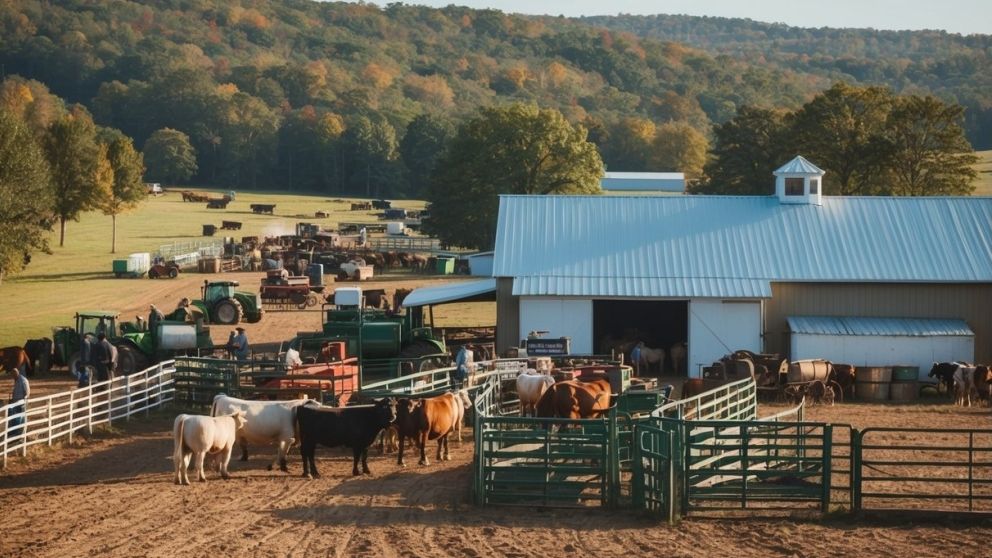Your Comprehensive Guide to Farm Auctions in Northern Alabama and Southern Tennessee: What You Need

Did you know farm auctions often sell properties 10-20% below market value? Understanding the auction process can be your key to unlocking incredible opportunities!
Farm auctions in Northern Alabama and Southern Tennessee offer unique opportunities for buyers seeking agricultural land and equipment.
These events bring together sellers and potential buyers in a dynamic marketplace. Farm auctions allow one to acquire valuable assets at competitive prices, often below market value.
Preparing for a farm auction requires research and planning. Buyers should familiarize themselves with the auction process, set a budget, and inspect items of interest before bidding.
It's crucial to understand the terms and conditions of the sale, including any applicable fees or taxes. Farm auctions in Alabama and Tennessee feature various agricultural properties and equipment.
From small family farms to large commercial operations, these auctions cater to various needs and preferences.
Buyers can find everything from tractors and harvesting equipment to fertile farmland ready for cultivation.
Key Takeaways
- Farm auctions offer potential savings on agricultural land and equipment
- Thorough preparation and research are essential for successful bidding
- Auctions provide diverse options for buyers with different needs and budgets
Why Farm Auctions Are A Unique Opportunity
The number of farms in the United States in 2023 is estimated at 1,894,950, highlighting their significant role in the country's landscape.
Farm auctions offer distinct advantages for buyers and sellers of agricultural properties. They provide a competitive marketplace with the potential for favorable deals and efficient transactions.
The Advantages Of Farm Auctions Over Traditional Sales
Farm auctions create a sense of urgency that can benefit both buyers and sellers. For sellers, auctions often result in quicker sales compared to traditional listings.
Buyers benefit from seeing all competing bids openly, ensuring fair pricing.
Auctions bring together motivated sellers and serious buyers in one place.
This concentrated pool of interested parties can lead to lively bidding and fair market prices.
Farm auctions offer unique opportunities for transferring ownership of agricultural assets. They follow set procedures that add structure to the sales process.
Rural property auctions have become popular for buying and selling farmland in northern Alabama and southern Tennessee. These events attract local farmers, investors, and land enthusiasts.
How Auctions Provide Better Deals For Buyers
Due to their transparency, auctions can lead to better deals for buyers. All bids are public, so buyers know exactly what others are willing to pay.
This open process helps prevent overpaying. Buyers can see the market value in real-time and adjust their bids accordingly.
Farm auctions often feature properties that may not be available through traditional sales channels, giving buyers access to a wider range of options.
Buying land at farm auctions can be an exciting way to invest in farmland.
Auctions allow buyers to act quickly when they find a desirable property. In some cases, motivated sellers may set low starting bids. This creates potential for buyers to acquire properties below market value.
How To Prepare For A Farm Auction
Getting ready for a farm auction takes careful planning and research. Knowing what to expect and how to prepare can make a big difference in your success as a bidder.
Let's look at some key steps to take before auction day arrives.
Researching The Farm And Auctioneer
Start by learning all you can about the farm up for auction. Check public records for details on acreage, soil types, and recent crop yields.
Drive by the property to see its condition firsthand. Look into any easements or zoning restrictions that could affect land use.
Research the auction company, too. Experienced auctioneers will have a solid track record of successful farm sales.
Read reviews from past buyers and sellers. Ask about their bidding process and rules. Knowing how the auction will run helps you feel more confident on the big day.
Make a list of questions to ask the auctioneer before bidding starts. This could include details on mineral rights, water access, or recent improvements to buildings and fences.
Financial Preparation Before Bidding
Get your finances in order well before the auction date. Then, talk to lenders about farm auction financing options.
Many require pre-approval, so start this process early.
Have cash or a cashier's check ready for the deposit. Most auctions require a 10-20% down payment on auction day. The full balance is often due within 30-45 days.
Budget for extra costs beyond the land price. These may include:
- Closing fees
- Property taxes
- Insurance
- Equipment or livestock purchases
- Initial operating expenses
Having a clear budget helps you bid with confidence and avoid overspending.
Setting A Maximum Bid Limit
Decide on your top bid amount before the auction starts. Base this on:
- Your budget and financing
- Recent sale prices of similar farms
- The property's earning potential
- Needed repairs or improvements
Once bidding begins, stick to your limit. Getting caught up in the excitement and bidding too high is easy. Writing down your maximum bid can help you stay on track.
Consider bringing a trusted advisor to the auction. They can offer an outside view and help you avoid emotional decisions.
Remember, there will always be other auctions if this one doesn't work out.
Uncover the full potential of farm auctions with expert guidance from Underwood Land Company. Get personalized advice to navigate these events successfully and maximize your investment. Schedule Your Consultation now and take a step closer to expanding your agricultural holdings.
Understanding The Farm Auction Process
Farm auctions have unique procedures and terms. Knowing what to expect on auction day, understanding key terminology, and being prepared for what happens after winning a bid is crucial for success.
The Auction Day Experience: What To Expect
On auction day, arrive early to register and preview items. Bring proper identification and payment methods.
Auctions often start with smaller items before moving to larger equipment or land parcels.
Auctioneers speak quickly, so listen carefully. They'll describe each item and start the bidding.
Raise your bidder card or make a clear gesture to bid. Stay aware of the current bid and your budget.
Some auctions use a reserved pricing system. This means the seller can reject the highest bid if it doesn't meet their expectations. Others are absolute, where the highest bid always wins.
Key Auction Terms You Need To Know
- Bid increment: The amount by which bids increase.
- Reserve price: The minimum price a seller will accept.
- Buyer's premium: An extra fee, usually a percentage, is added to the winning bid.
- As-is condition: Items are sold without warranties or guarantees.
- Lot: A group of items sold together as one unit.
- Absentee bid: A maximum bid placed before the auction starts.
What Happens When You Win The Auction?
After winning a bid, you'll need to finalize the purchase quickly.
Head to the cashier's area to complete paperwork and make payment. Some auctions require full payment on the spot, while others may offer financing options.
For equipment, arrange transportation. Many auctions have a pickup deadline.
For land, you'll likely need to schedule a closing date and may need to put down earnest money.
Keep all receipts and documentation. These are important for taxes and proof of ownership. Remember, auction sales are typically final, so inspect items carefully before bidding.
Mistakes To Avoid When Bidding On A Farm
Farm auctions can be exciting, but they also come with risks. Smart bidders avoid common pitfalls to get good deals on quality land and equipment.
Avoid Emotional Bidding
Getting caught up in the excitement of an auction can lead to costly mistakes. Set a firm budget before the event and stick to it.
Don't let competition push you past your limit.
Take breaks if the bidding gets intense. Step away to clear your head and reassess.
Keep your goals in mind. Focus on what you need, not what others are bidding on. Avoid the temptation to outbid rivals just to "win."
Skipping The Pre-Auction Research
Proper preparation is key to auction success. Inspect items in person if possible and check the market values of similar farms or equipment.
Ask questions about the property's history, condition, and potential issues. Then, review all auction terms and conditions carefully.
Research the seller and auction company. Look for reputable firms with good track records. Understand all fees before bidding.
Consider getting expert opinions on high-value items. The cost of a professional inspection could prevent a bad purchase.
Underestimating Future Costs
When bidding on a farm, look beyond the purchase price and factor in ongoing expenses like taxes, insurance, and maintenance.
Equipment auctions may require budgeting for repairs or upgrades. When purchasing land, consider soil quality, water access, and zoning restrictions. These can impact future profitability.
Remember potential environmental issues. Fuel tanks or pesticides may contaminate old farm sites. If necessary, factor in cleanup costs.
Think long-term about your farm goals. Will this purchase fit your plans in 5 or 10 years? Avoid impulse buys that don't align with your strategy.
Enhance your farm auction experience with the Underwood Land Company app. Gain instant access to auction listings, real-time updates, and expert guidance right at your fingertips. Download Our App today and start making more informed investment decisions in agricultural real estate!
What To Expect After Winning A Farm Auction
Winning a farm auction is exciting, but it's just the first step. Important legal and financial tasks must be completed before you can call the farm your own.
Legal And Financial Steps Post-Auction
After winning a farm auction, you must sign a purchase agreement. This document outlines the terms of the sale. You'll also need to pay a deposit, usually 10% of the purchase price.
If you haven't already, the next step is to arrange financing. Banks may require an appraisal of the property, which can take a few weeks.
You'll need to review and sign legal documents. These may include deed transfers and farm auction regulations specific to Alabama or Tennessee. It's wise to have a lawyer look these over.
Closing The Sale: What Happens Next?
The closing process typically takes 30 to 60 days.
You'll work with the seller to transfer utilities and arrange for property insurance during this time.
You may need to set up farm service accounts. These could include things like irrigation services or co-op memberships.
A title search will be done to ensure the property is free of liens. You'll also need to get a survey of the land.
On closing day, you'll sign the final papers and pay the remaining balance. The deed will then be transferred to you. After that, the farm is officially yours.
Remember to keep all documents from the auction and closing. You may need them for tax purposes or future reference.
How Underwood Land Company Can Help You Secure The Perfect Farm
Underwood Land Company offers expert guidance and strong broker relationships to help buyers find ideal farm properties.
Their team has a proven track record of client success stories in northern Alabama and southern Tennessee.
Expert Guidance From Start To Finish
Underwood Land Company provides personalized support throughout the farm buying process. Their experienced agents take the time to understand each client's needs and goals.
They offer:
- Property evaluations
- Financial advice
- Auction strategies
- Negotiation assistance
Agents carefully review farm listings and auction catalogs to identify promising opportunities. They conduct thorough research on soil quality, water resources, and infrastructure.
During auctions, Underwood representatives advise clients on bidding strategies. They help set reasonable price limits based on property values and market trends.
Building Relationships With The Best Brokers
Underwood Land Company maintains strong connections with top agricultural brokers across the region. These relationships give clients access to exclusive listings and insider information.
Key benefits include:
- Early notice of upcoming auctions
- Details on off-market properties
- Insights on local farming conditions
The company's extensive network covers a wide range of farm types. Whether buyers seek row crop land, livestock pastures, or timber tracts, Underwood can locate suitable options.
Their team stays updated on regional agricultural trends. This knowledge helps match clients with properties that align with their long-term goals.
Dive into the dynamic world of farm auctions with Underwood Land Company. Seize the chance to secure prime agricultural land in Northern Alabama and Southern Tennessee at prices below market value. Explore Our Farm Auction Listings and make your next strategic investment today!
Frequently Asked Questions
How can you participate in farm auctions in Northern Alabama?
Get a bidder number to attend farm auctions in Northern Alabama. Arrive early to inspect items. Bring proper ID and payment methods. Some auctions may require pre-registration.
Check local auction listings for dates and locations. Many Alabama farm auctions are posted online with details.
What key factors should you consider before bidding in a Southern Tennessee auction?
Research the farm equipment or land up for sale. Then, set a budget and stick to it. Know the item's market value and auction prices in the area.
Next, check the auction terms and conditions. Some may have buyer's premiums or other fees. Make sure to understand payment and removal deadlines.
What does 'reserve' mean in an auction setting?
A reserve is the lowest price a seller will accept. If bids don't reach the reserve, the item won't sell. Some auctions are "absolute" with no reserve.
Not all auctions disclose if there's a reserve. Ask the auctioneer if unsure. Reserves protect sellers from low prices.
How does the bidding process differ in live versus online farm auctions?
Live auctions happen in person. Bidders raise hands or cards to bid. The auctioneer calls out prices and spots bids. It's fast-paced and exciting.
On the other hand, online auctions allow people to bid from anywhere. Bids are placed through a website. These often last longer, sometimes days, and bidders can set maximum bids.
What are the common types of farm equipment sold at auctions in this region?
Tractors combine, and plows are often sold. Livestock trailers and feed equipment are common, too. Irrigation systems and grain bins also appear.
Seasonal equipment like planters or harvesters sells based on the time of year. Smaller tools and farm supplies are usually available, too.
What legal considerations should one keep in mind when purchasing at a farm auction?
Know the auction rules and regulations for each state. Alabama and Tennessee have different laws.
Understand title transfer and any liens on equipment. Be aware of tax implications. Some items may need to be registered. Get receipts and proper documentation for all purchases.



